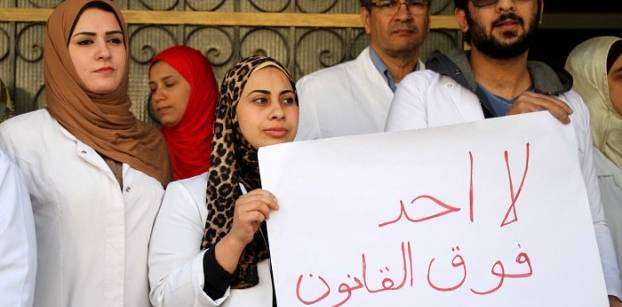Latest NEWS
- Aswat Masriya, the last word
- Roundup of Egypt's press headlines on March 15, 2017
- Roundup of Egypt's press headlines on March 14, 2017
- Former Egyptian President Hosni Mubarak to be released: lawyer
- Roundup of Egypt's press headlines on March 13, 2017
- Egypt's capital set to grow by half a million in 2017
- Egypt's wheat reserves to double with start of harvest -supply min
- Roundup of Egypt's press headlines on March 12, 2017
Health ministry objects to doctors' decision to abstain from collecting fees from patients
CAIRO, Mar 7 (Aswat Masriya) – Since the doctors' syndicate decided to treat patients in public hospitals free of charge, there has been a slew of contradicting statements by the syndicate and health ministry.
The syndicate urged doctors to abstain from collecting treatment fees from citizens, saying that doing so is a legal right. The health ministry, on the other hand, warned doctors from abstention, considering it a waste of public funds.
The doctors' syndicate decided to abstain from accepting fees on Feb. 12 during a general assembly meeting held in response to the reported assault on doctors in the Matariya Teaching Hospital by policemen.
The incident dates back to Jan. 28 when a video published by Egyptian news portal Mobtada featured a doctor recounting the details of how he was "dragged" and "handcuffed", after he told a low ranking policeman that his wound was "superficial" and would likely not require stitches.
The doctors decided to implement the decision starting Feb. 27.
The Health Ministry issued a statement last week saying that the medical fare paid by citizens in public hospitals is earned by the state and is included in the state's general budget expenditure on other sectors, not limited to the health sector only.
The ministry warned that from a legal perspective, the call against collecting the payment is a call to not apply the law.
Deputy head of the doctors' syndicate Mona Mina told Aswat Masriya that what the syndicate means by free treatment is to not push patients to pay any extra fees, more than the medical fare that they have to pay to be treated in public hospitals' external clinics. The fare ranges between EGP 1-3.
Public hospitals provide treatment with a higher charge called "the economic fee", which can be given after the fee-free working hours, usually starting at 2 pm.
The syndicate says that hospitals force patients in some cases to get the free treatment but still charge them the economic fee.
According to Mina, the service instructions in hospitals made the economic treatment a choice, but practically there have been cases in which citizens are obligated to pay the cost of treatment during free treatment hours or pay for free tests and examinations.
Mina added that hospitals can refrain from issuing free tickets, which pushes the citizen to pay the economic fee.
Ehab Taher, the syndicate's secretary general told Aswat Masriya that public hospitals' violations were increasing gradually over the past years until it became the rule, making the free treatment the exception.
By comparing the syndicate's statements and the ministry's statements, it is clear that both do not disagree that current legislation on healthcare provides citizens the right to free treatment in exchange for a symbolic fee.
But while the syndicate says this right is being violated in public hospitals and has been vocal against said violations, the ministry says no such violations have been detected.
Mina said the health ministry's statements need "scrutiny".
The health ministry spokesman did not respond to Aswat Masriya's request for comments on the syndicate's criticism of the hospitals' performance.
Alaa Ghanam, the director of the Right to Health Programmme at the Egyptian Initiative for Personal Rights, said that several public hospitals are forcing citizens to pay the economic fee for treatment that should be free.
He said hospitals do so because of their funding needs, since the government's spending is inadequate for hospitals' actual needs.
Yet, Ghanam believes that free treatment is not a sustainable solution. He said it is more efficient to push for the implementation of a new healthcare system that includes all citizens and to create sustainable ways to fund the free treatment for those incapable of payment.











